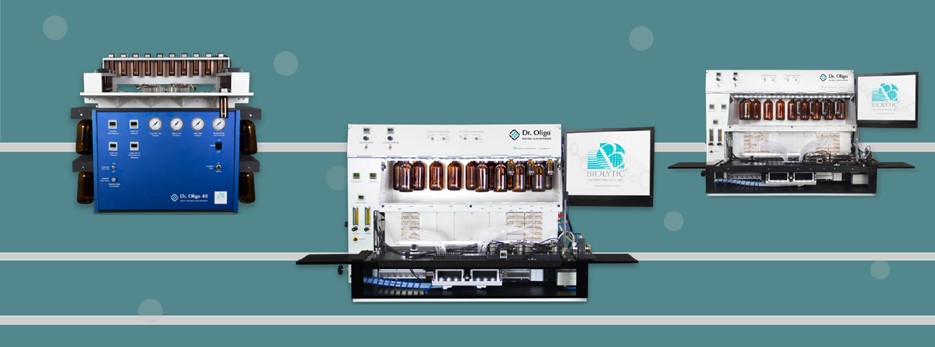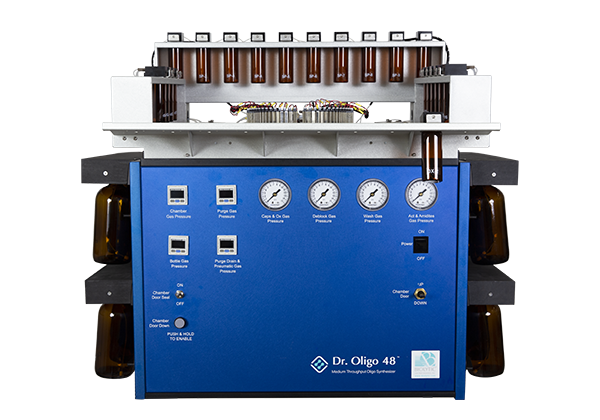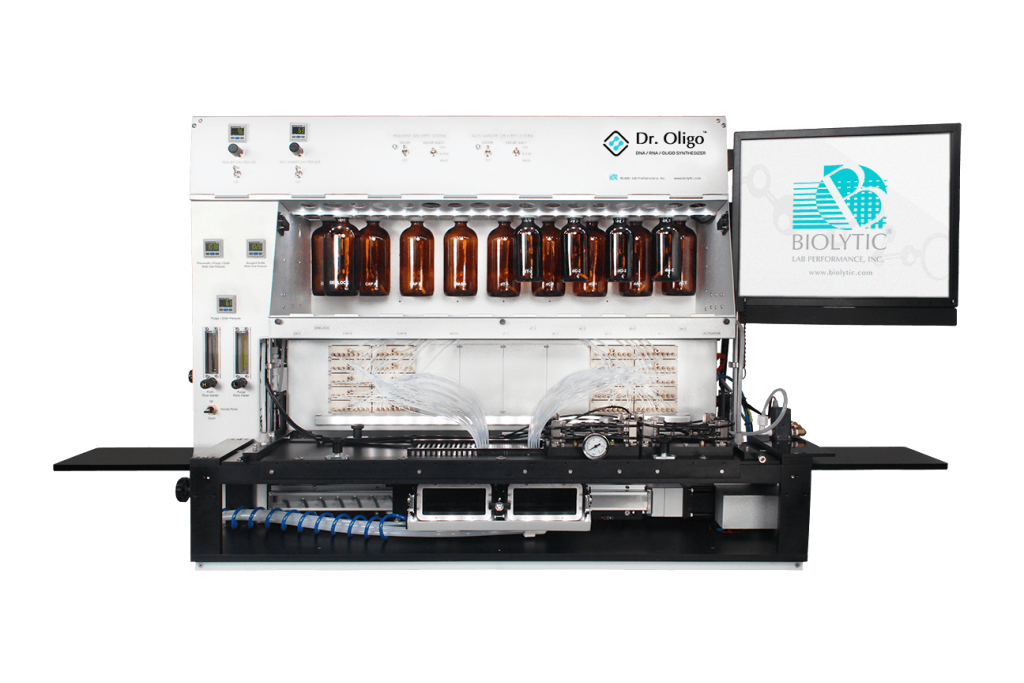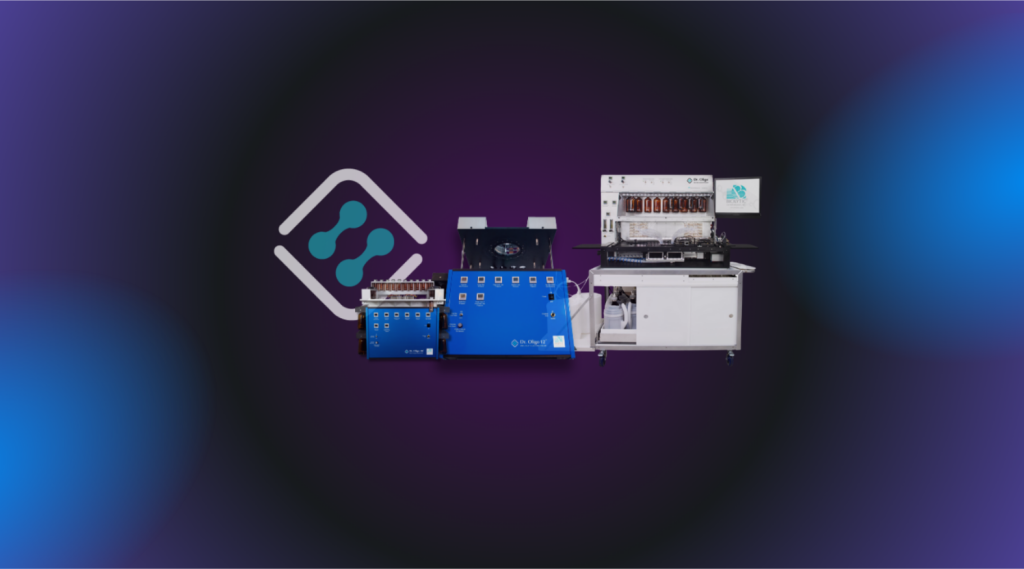
So you are in the process of bringing oligonucleotide synthesis into your laboratory. With confusing specifications and a plethora of features to choose from, picking the right tools and instruments can be an overwhelming process. With over 30 years of experience pairing customers from small research laboratories to large pharmaceutical companies with the right DNA RNA oligonucleotide synthesizer and configuration needed for their scientific breakthroughs, we have mastered the decision process to a science. Below we list expertly curated questions you should consider when purchasing a DNA RNA Oligonucleotide synthesizer, which will guide you in determining the features and specifications that are important for your application.

How do DNA RNA Oligonucleotide Synthesizers Work?
The chemistry behind DNA RNA oligonucleotide synthesis is solid-phase synthesis. (Learn more about solid-phase synthesis here). DNA RNA oligonucleotide synthesizers automate this chemical process by using gas pressure to push reagents through synthesis media, building oligos one base at a time on solid supports (typically Controlled Pore Glass CPG, or polystyrene).
DNA RNA Oligonucleotide synthesizers vary in the specifications and features that they offer including:
- Reagent Bottle Support and Configuration
- Software Capabilities
- Synthesis Consumables Compatibility
- Oligo Throughput
- and more
With a multitude of specifications to consider, how can you decide which oligo synthesizer is right for you?

Questions to ask before choosing a DNA RNA Oligonucleotide Synthesizer
- Are you synthesizing DNA or RNA, both, or other?
The first step is to choose an instrument that can synthesize your molecule of choice. What reagents does your molecule require? Does the synthesizer support the chemistry settings needed to synthesize these molecules? - What is the range of oligo length and scale range in nmol or pmol you want to make or yield?
Determining the length of your oligo will help you determine what consumables are needed to successfully synthesize the length of oligo you need. Oligo length success is determined by the solid synthesis support you choose. It is independent of synthesizer capability. Although the oligo synthesizer is not directly responsible for the length of an oligo, determining the correct synthesis consumable you need, whether it is a synthesis column, or synthesis plate will dictate which synthesizer you choose, based on the synthesizer’s compatibility with certain synthesis consumables.
Likewise, determining the yield of oligo you need will also determine the type of synthesis consumables you will use. Synthesis consumables and synthesis instruments vary in the scales that they support. - Are you using any special modifications such as dyes, spacers, or non-standard amidites?
Oligonucleotide synthesizers can vary in reagent configuration. Depending on the synthesizer, number of bottle reagents and tubing can vary. Determining the number of special reagents you will need will determine the number of reagent bottle positions you need.
Another feature you need to consider is the instrument’s software capabilities. Is the instrument able to easily distinguish and dispense from special reagents? Are the coupling times and other parameters modifiable? How does the instrument handle special modifications to the oligo? - On average, how many oligos do you plan to make per day or week or month or year?
Determining the amount of oligos you plan on synthesizing will help determine your oligo throughput, or rate at which you will be synthesizing oligos. DNA RNA Oligonucleotide synthesizers can range from low / medium throughput, to high / ultra-high throughput.
Depending on your use case, a small to medium throughput oligo synthesizer is a great choice for smaller laboratories looking to experiment with different molecules, or just need a few oligos per day / week. A high / ultra-high throughput instrument may be better suited for larger production ready laboratories, or any laboratory that needs higher yields. - Are you using synthesis for R&D or production?
Different laboratory settings require varying levels of regulation. Typically, production facilities require specific regulatory documents and services to ensure quality and consistency. Some companies selling DNA RNA oligonucleotide synthesizer only offer instruments and do not offer the necessary documents and services required for production facilities. Services and documents may include Instrument Qualification (IQ), Operational Qualification (OQ), Preventative Maintenance (PM) and more. - Are you looking for a turnkey, all-in-one oligonucleotide synthesis solution?
Deciding on a DNA RNA oligonucleotide synthesis is only a part of the entire oligonucleotide synthesis process that needs to be considered. Synthesis consumable compatibility and synthesis protocols are examples of other decisions that play a role in the consideration of purchasing an oligonucleotide synthesizer. Does the synthesizer come with working protocols to get oligonucleotide synthesis experiments started? Are the protocols compatible to work with readily available synthesis consumables? Are synthesis protocols easily modifiable using the instrument’s software?
The Dr. Oligo Line of DNA RNA Oligonucleotide Synthesizers

Biolytic Lab Performance, Inc.’s Dr. Oligo line of DNA RNA oligo synthesizers are available in medium throughput, high throughput, and ultra-high throughput, with customizable reagent bottle configurations to meet your specific needs. Whether you’re synthesizing DNA, RNA, LNA, or other modified oligos, Dr. Oligo synthesizers have the hardware and software required for successful synthesis.

Dr. Oligo 48
- Low / Medium Throughput
- Dr. Oligo 48
- 48 oligos per run5 nmol to 5 umol synthesis scale
- DNA, RNA, LNA, 2’-Modified RNA, Mixed Backbones DNA and RNA
- 42 Max Reagents
- Synthesis Columns

Dr. Oligo 192XLc
- High Throughput
- 192 oligos per run
- 5 nmol to 5 umol synthesis scale
- DNA, RNA, LNA, 2’-Modified RNA, Mixed Backbones DNA and RNA
- 37 Max Reagents
- Synthesis Columns or 96-well Synthesis Plates

Dr. Oligo 768XLc
- Ultra-High Throughput
- 768 oligos per run
- 2 nmol to 100 nmol synthesis scale
- DNA, RNA, LNA, 2′-Modified RNA, Mixed Backbones DNA and RNA
- 25 Max Reagents
- 384-well Synthesis Plates
All Dr. Oligo DNA RNA Oligonucleotide Synthesizers are compatible with commonly used synthesis consumables. We offer a complete solution with guaranteed to work synthesis protocols using our line of synthesis consumables.
Service plans and preventative maintenance executed by our experienced engineers are available with oligonucleotide synthesizers. We provide all necessary documents and services required by production facilities including Instrument Qualification (IQ), Operational Qualification (OQ), Preventative Maintenance (PM), and more.
Conclusion
Through reading this, we hope you have a better understanding of the specifications and features you will need to look for in a DNA RNA oligonucleotide synthesizer. If additional support is needed in your purchasing decision, we are here to help





